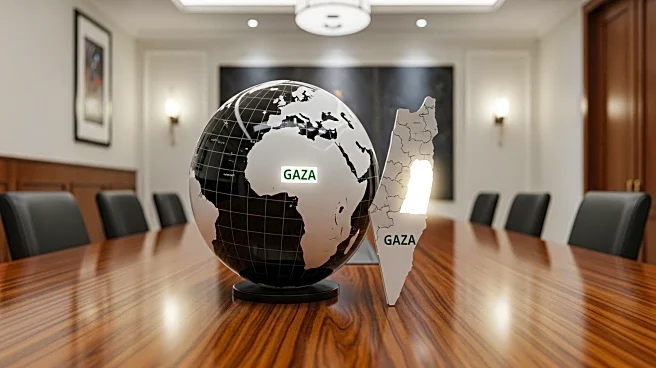What's Happening?
President Trump has unveiled a detailed map as part of his 21-point Gaza peace plan, which outlines an initial withdrawal of Israeli Defense Forces (IDF) from Gaza. The plan aims to facilitate the release of hostages held by Hamas and envisions a phased pullback of IDF forces. The map shows specific areas, such as Rafah and Beit Hanoun, remaining under Israeli control, with a security perimeter maintained along the Strip's borders. The plan includes transferring control to an international Arab-Muslim force to ensure demilitarization. Negotiations in Cairo involve Hamas, Israel, and U.S. representatives, focusing on hostages' release and Israeli withdrawal from certain areas.
Why It's Important?
The plan represents a significant diplomatic effort by President Trump to address the ongoing conflict in Gaza. It aims to balance military and diplomatic strategies to achieve peace and stability in the region. The phased withdrawal and demilitarization could reduce tensions and foster cooperation among international stakeholders. However, the plan faces opposition from Hamas, which objects to the depth of Israeli control outlined in the map. Successful implementation could enhance U.S. influence in Middle Eastern peace processes and impact regional security dynamics.
What's Next?
Negotiations in Cairo are expected to continue, with discussions focusing on the technical details of hostages' release and the phased withdrawal. Israel and the U.S. aim to finalize the agreement within days, while keeping open the possibility of resuming military operations if diplomatic efforts fail. The plan's success depends on Hamas's cooperation and the establishment of the international force to oversee demilitarization. The outcome could influence future diplomatic and military strategies in the region.
Beyond the Headlines
The plan's implementation could have long-term implications for regional geopolitics, potentially altering power dynamics and alliances. Ethical considerations arise regarding the treatment of hostages and the impact on civilian populations. The plan's success or failure could affect President Trump's legacy in foreign policy and influence U.S. relations with Middle Eastern countries.









